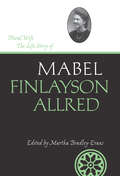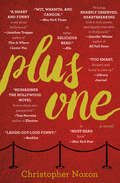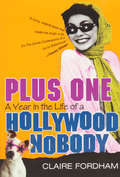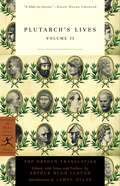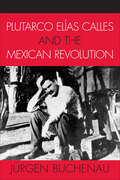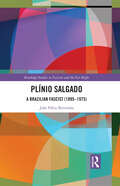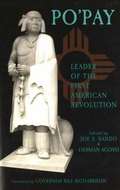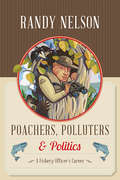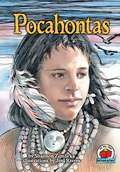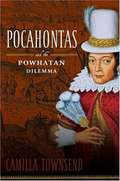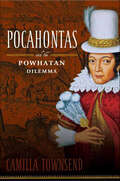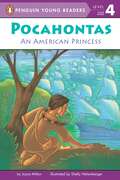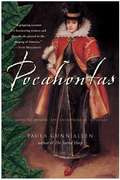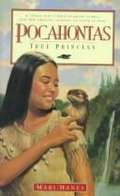- Table View
- List View
Plural Wife: The Life Story of Mabel Finlayson Allred (Life Writings Frontier Women #13)
by Mabel Finlayson AllredMabel Finlayson Allred was a wife of Rulon Allred, leader of the Apostolic United Brethren, one of the major groups of fundamentalist Mormons who, since about the 1930s, have practiced plural marriage as separatists from the mainstream Latter-day Saints Church. Mabel’s autobiography maintains a mood of everyday normalcy strikingly in contrast with the stress of the ostracized life she was living. Her cheerful tone, expressive of her wish to live simply and gracefully in this world, is tempered by more somber descriptions of her personal struggle with clinical depression, of Rulon Allred’s inner struggles, of tensions with the law and with Allred’s fundamentalist colleagues, and ultimately by her forthright account of his assassination. Emerging from this unique narrative is the portrait of a woman buoyed by faith in both her religion and her husband, a window into the interior life of a woman seeking a resilient simplicity in an uncommonly challenging life. Plural Wife, conntextualized by Martha Bradley’s introduction, gives us insight into Mabel’s experience of history during an important period of the 20th century and advances our understanding of life ways of 20th century polygamy and the growth of the fundamentalist movement.
Plus One: A Novel
by Christopher Noxon"Plus One is a smart and funny novel about Hollywood, but where it truly shines is in Noxon's stunning and painfully accurate depiction of the complex rhythms and growing pains of a marriage." - Jonathan Tropper, author of This Is Where I Leave You and One Last Thing Before I Go"Well observed, honest, and laugh-out-loud funny, Plus One tells a story from the inside of show business about being on the outside."- Matthew Weiner, creator of Mad MenChristopher Noxon's debut novel Plus One is a comedic take on bread-winning women and caretaking men in contemporary Los Angeles. Alex Sherman-Zicklin is a mid-level marketing executive whose wife's fourteenth attempt at a TV pilot is produced, ordered to series, and awarded an Emmy. Overnight, she's sucked into a mad show-business vortex and he's tasked with managing their new high-profile Hollywood lifestyle. He falls in with a posse of Plus Ones, men who are married to women whose success, income, and public recognition far surpasses their own. What will it take for him to regain the foreground in his own life?Christopher Noxon is an accomplished journalist who has written for such publications as the New Yorker, Details, Los Angeles Magazine, Salon, and the New York Times Magazine; his first book, Rejuvenile: Kickball, Cartoons, Cupcakes, and the Reinvention of the American Grown-Up (Crown), earned him interviews on such shows as the Colbert Report and Good Morning America and generated features in USA Today, the Wall Street Journal, and Talk of the Nation; Ira Glass of This American Life called the book "an eye-opener." Noxon happens to be married to a top TV writer/producer and does the school chauffeuring for their three children, so he knows whereof he speaks regarding Plus Ones. He lives in Los Angeles, California.
Plus One: A Year In The Life Of A Hollywood Nobody
by Claire FordhamAt forty, Claire Fordham is at a crossroads. The divorced British mom has raised two mostly well-adjusted kids and worked as a journalist. But after a lifetime of looking after everyone else, she's ready to live a bit. So she says goodbye to England and moves to L. A. to live with her sister, respected songwriter Julia Fordham. Her first job is taking care of Julia's highly neurotic dog, Muttley, a "four-legged freak of nature" who, when he isn't destroying her shoes or mounting anything on legs, compulsively licks his anus. Welcome to Hollywood. What follows is a year-long, laugh-out-loud story of a stranger in a very, very strange land. As Julia's "Plus One"--the nameless guest invited to openings and parties--Claire experiences life in the shadow of celebrity in a town where nothing is too surreal. From clairvoyants who get everything wrong, partygoers who are disappointed that Claire and Julia are sisters, not lesbians, Pink Witch parties, legendary icons in the garden, and people whose pets have their own lawyers on retainer to meeting Hollywood royalty, inventing fantasy boyfriends, playing roadie in exotic locales, falling for the wrong guys and possibly meeting the right man, Claire's on a rollercoaster ride in which no dream is too wild, no adventure too outrageous, and no information too personal to divulge over fashionable coffee. And in a town where anything can happen and usually does, Claire might just find everything she ever wanted. . . if she can survive it. Candid, ribald, and sweetly optimistic, Plus One is a delicious tale of Tinseltown insanity and one woman's journey from Hollywood Nobody to somebody in her own right. "Claire Fordham is the funniest writer on the planet. I'd have her assassinated but that would only increase the sales of her howlingly hilarious memoir, Plus One. She's the real-life Bridget Jones--only funnier, more beautiful, and with a baggie of dog shit in her hand. "--Augusten Burroughs "Plus One made me weep with laughter. I couldn't put it down and I didn't want it to end. By the time I reached the story about the lost condom, I was crying, and my ribs ached. Very few books have ever made me laugh this hard. A gem. "--Haven Kimmel
Plutarch's Lives, Volume 2: Volume Ii: Large Print
by Arthur Hugh Clough Plutarch Tony PodleckiPlutarch's Lives, written at the beginning of the second century A.D., is a brilliant social history of the ancient world by one of the greatest biographers and moralists of all time. In what is by far his most famous and influential work, Plutarch reveals the character and personality of his subjects and how they led ultimately to tragedy or victory. Richly anecdotal and full of detail, Volume I contains profiles and comparisons of Romulus and Theseus, Numa and Lycurgus, Fabius and Pericles, and many more powerful figures of ancient Greece and Rome.The present translation, originally published in 1683 in conjunction with a life of Plutarch by John Dryden, was revised in 1864 by the poet and scholar Arthur Hugh Clough, whose notes and preface are also included in this edition.From the Trade Paperback edition.
Plutarco Elías Calles and the Mexican Revolution (Latin American Silhouettes)
by Jürgen BuchenauThis biography of the Mexican revolutionary examines his rise from soldier to president to his continued influence as Jefe Maximo. Hailing from the border state of Sonora, Plutarco Elías Calles found his calling in the early years of the revolution, quickly rising to national prominence. As president from 1924 to 1928, Calles undertook an ambitious reform program, modernized the financial system, and defended national sovereignty against an interventionist U.S. government. Yet these reforms failed to eradicate underdevelopment, corruption, and social injustice. Moreover, his unyielding campaigns against political enemies and the Catholic Church earned him a reputation as a repressive strongman. After his term as president, Calles continued to exert broad influence as his country's foremost political figure while three weaker presidents succeeded each other in an atmosphere of constant political crisis. He played a significant role in founding a ruling party that reined in power-hungry military leaders and helped workers attain better living conditions. This dynastic party and its successors, including the present-day Partido Revolucionario Institucional (Party of the Institutional Revolution), remained in power until 2000. Through this comprehensive assessment of a quintessential Mexican politician, Buchenau opens an illuminating window into both the Mexican Revolution and contemporary Mexico.
Plínio Salgado: A Brazilian Fascist (1895–1975) (Routledge Studies in Fascism and the Far Right)
by João Fábio BertonhaPlínio Salgado covers the life trajectory of the far-right Brazilian political leader between 1895 and 1975. The book initially follows his life from his birth, including political and cultural training and political activities between 1895 and 1930. The focus then shifts to his period as leader of the Brazilian fascist movement between 1932 and 1938, with attention to his performance as a leader, his role within the movement, and in the rise and fall of the Integralist Action. His period of exile in Portugal between 1939 and 1947 is also emphasized, with a special focus on his contacts with the Portuguese radical right and German and Italian agents. The final part addresses his return to Brazil, his efforts to reposition himself politically and his performance as a parliamentarian and supporter of the military coup of 1964. This book will be of interest to researchers of Latin American history, Brazilian history and politics, the transnational far right, and comparative fascism studies.
Po'pay: Leader of the First American Revolution
by Alfonso Ortiz Simon J. Ortiz Theodore S. Jojola Robert Mirabal Joseph H. Suina Joe S. Sando Herman AgoyoPo'pay led the Pueblo revolt of 1680, which ousted the Spanish from New Mexico until 1692. In conjunction with the 2005 placing of a statue of the leader in the US Capitol's National Statuary Hall, a historian and tribal leader from New Mexico Pueblos present the first book on this leader and his legacy from a Pueblo perspective. It includes a foreword by New Mexico governor Bill Richardson, a chronology, images of the statue, and commemorative statements. Annotation ©2007 Book News, Inc., Portland, OR (booknews.com)
Poachers, Polluters and Politics
by Randy NelsonRetired fishery officer Randy Nelson's first love was catching poachers. That obsession, plus a devious mind and enthusiasm for marathon running, spelled big trouble for law-breaking fishermen. Thirty-five years in the field (and stream) netted a gold mine of stories with hair-raising tales of grizzly bear attacks, angry axe-wielding, rock-throwing, shotgun-blasting fishermen and high-speed chases on dirt roads and through bush. Poachers, Polluters and Politics provides a rare glimpse into the lives of DFO officers and the communities in which they live. Here too are stories showing the lighter side of the DFO, like how Nelson honed his "psychic powers," and recollections of life in a rodent-infested, government-issue trailer-where his wife Lorraine once awoke to find a mouse chewing her hair.Firm but fair, and always innovative, Randy Nelson usually earned the-often grudging-respect of communities and fishermen he encountered. Whether it meant carving a peephole in a hollow tree or teaching his dog to sniff for salmon, Nelson was constantly scheming up new and tricky ways to catch poachers and polluters, many of them known violent criminals. Nelson spent a career dedicated to protecting BC's waters and fish population and his passion for his work shines through with every word, drawing the reader into the exciting world of protecting wildlife and prosecuting bad guys.
Pocahontas
by Leslie GourseExamines the life of the Indian princess Pocahontas and her contact with English settlers, especially John Smith.
Pocahontas (On My Own Biography)
by Shannon ZemlickaAs the young daughter of a powerful Powhatan leader, Pocahontas befriended the English settlers in Jamestown, Virginia. Although she helped them survive their difficult first years, and she may have saved settler John Smith's life, they took Pocahontas captive. After her release, Pocahontas married an English settler and journeyed to England. Although she was just twenty-one years old when she died, Pocahontas changed American history through her compassion and friendship.
Pocahontas and the Powhatan Dilemma
by Camilla TownsendIn reality, the English kidnapped Pocahontas in the midst of a war against her people, and kept her prisoner for many months while they waited for her father to agree to tribute payments of corn. Pocahontas ended the conflict when she converted to Christianity and married a colonist named John Rolfe. She and several of her family members then chose to travel to Europe, not as prisoners but as free agents intent on gathering information that might clarify the Al-gonkians' future course. The mythical Pocahontas who loved John Smith, the English, the Christian faith, and London more than she loved her own father or people or faith or village deeply appealed to the settlers of Jamestown and the court of King James. All these storytellers subverted her life to satisfy their own need to believe that the Indians loved and admired them (or their cultural forebears) without resentments, without guile. She deserves better. A woman as brave as Pocahontas-who endured a kidnapping, explored an alien faith, dared to marry a foreigner, and faced the voyage across the sea for the sake of her people-deserves a great deal more. She was as brave as all her people-not a simple joyful worshipper of English men or power, but a real and complicated woman with her own plans, goals, and ideas. She is worthy of our respect, not condescension.
Pocahontas and the Powhatan Dilemma: The American Portraits Series
by Camilla TownsendCamilla Townsend's stunning new book, Pocahontas and the Powhatan Dilemma, differs from all previous biographies of Pocahontas in capturing how similar seventeenth century Native Americans were--in the way they saw, understood, and struggled to control their world---not only to the invading British but to ourselves.Neither naïve nor innocent, Indians like Pocahontas and her father, the powerful king Powhatan, confronted the vast might of the English with sophistication, diplomacy, and violence. Indeed, Pocahontas's life is a testament to the subtle intelligence that Native Americans, always aware of their material disadvantages, brought against the military power of the colonizing English. Resistance, espionage, collaboration, deception: Pocahontas's life is here shown as a road map to Native American strategies of defiance exercised in the face of overwhelming odds and in the hope for a semblance of independence worth the name.Townsend's Pocahontas emerges--as a young child on the banks of the Chesapeake, an influential noblewoman visiting a struggling Jamestown, an English gentlewoman in London--for the first time in three-dimensions; allowing us to see and sympathize with her people as never before.
Pocahontas: An American Princess (Penguin Young Readers, Level 4)
by Joyce MiltonPocahontas is famous for saving the life of Captain John Smith, the man she loved. At least that’s what legend tells us. Now read the true story of this Native American princess.
Pocahontas: Her Life And Legend (Social Studies: Informational Text Ser.)
by Heather E. SchwartzIgnite your students' passion for history through the use of intriguing primary sources! The Primary Source Reader series features purposefully leveled text to increase comprehension for different learner types. Students will learn about the fascinating life and times of Pocahontas. This informational text includes captions, a glossary, an index, and other text features that will increase students' reading comprehension and literacy. It aligns with state standards including NCSS/C3, McREL, and WIDA/TESOL and prepares students for college and career readiness.
Pocahontas: Medicine Woman, Spy, Entrepreneur, Diplomat
by Paula Gunn AllenPocahontas is a bold biography that tells the extraordinary story of the beloved Indian maiden from a Native American perspective. Dr. Paula Gunn Allen, the acknowledged founder of Native American literary studies, draws on sources often overlooked by Western historians and offers remarkable new insights into the adventurous life and sacred role of this foremost American heroine. Gunn Allen reveals why so many have revered Pocahontas as the female counterpart to the father of our nation, George Washington.
Pocahontas: True Princess
by Mari D. HanesWritten for children ages 8-12, this well-researched book tells the exciting story of Chief Powhatan's brave daughter and the amazing adventures that led her to her heavenly Father.
Pocket Bios: Albert Einstein (Pocket Bios)
by Al BerengerA colorfully illustrated, pocket-size picture book biography of famed physicist Albert Einstein.Albert Einstein, a theoretical physicist, developed the theory of relativity and is popularly known today for his mass-energy equivalence formula E=mc^2. In 1921, he received the Nobel Prize in Physics for his contributions to theoretical physics, particularly for discoveries and research that proved pivotal for quantum theory. Pocket Bios are full of personality, introducing readers to fascinating figures from history with simple storytelling and cheerful illustrations. Titles include men and women from history, exploration, the sciences, the arts, the ancient world, and more.
Pocket Bios: Blackbeard (Pocket Bios)
by Al BerengerA colorfully illustrated, pocket-size picture book biography of the notorious English pirate Blackbeard.Blackbeard, born Edward Teach, was a notorious and much-feared English pirate who famously conquered and captained the Queen Anne's Revenge and prowled the seas around the West Indies and the eastern coast of Britain's North American colonies. Rather than ruling through force and bloody intimidation, it's believed that Blackbeard largely let his fierce image and reputation drive his success.Pocket Bios are full of personality, introducing readers to fascinating figures from history with simple storytelling and cheerful illustrations. Titles include men and women from history, exploration, the sciences, the arts, the ancient world, and more.
Pocket Bios: Charlie Chaplin (Pocket Bios)
by Al BerengerA colorfully illustrated, pocket-size picture book biography of actor and silent film legend Charlie Chaplin.Charlie Chaplin, renowned comic silent film icon, enjoyed a successful seventy-five year career as an actor, filmmaker, and composer. Born into a life of poverty and hardship in London, he began working before he was nine years old and rose quickly to fame for his persona "the Tramp." One of the best known figures in the world during his heyday, Chaplin is still famous today for his myriad of iconic silent film roles.Pocket Bios are full of personality, introducing readers to fascinating figures from history with simple storytelling and cheerful illustrations. Titles include men and women from history, exploration, the sciences, the arts, the ancient world, and more.
Pocket Bios: Cleopatra (Pocket Bios)
by Al BerengerA colorfully illustrated, pocket-size picture book biography of legendary Egyptian queen Cleopatra.Cleopatra, the last pharaoh of ancient Egypt, was a powerful and passionate leader worshipped by her people as a god for her beauty and her accomplishments. Explore this legendary female ruler's illustrious beginnings through to her tragic end.Pocket Bios are full of personality, introducing readers to fascinating figures from history with simple storytelling and cheerful illustrations. Titles include men and women from history, exploration, the sciences, the arts, the ancient world, and more.
Pocket Bios: Coco Chanel (Pocket Bios)
by Al BerengerA colorfully illustrated, pocket-size picture book biography of renowned fashion designer Coco Chanel.Gabrielle Bonheur "Coco" Chanel, French fashion designer and businesswoman, is famous for founding the famous Chanel brand and for popularizing a new, more sporty and relaxed aesthetic for women's clothing. Follow Chanel's life and accomplishments from her childhood in Saumur to her eventual creation of the successful couture empire she's known for today.Pocket Bios are full of personality, introducing readers to fascinating figures from history with simple storytelling and cheerful illustrations. Titles include men and women from history, exploration, the sciences, the arts, the ancient world, and more.
Pocket Bios: Frida Kahlo (Pocket Bios)
by Al BerengerFrida Kahlo remains one of the most celebrated painters of her time for her exploration of themes of feminism, gender, class, and race in her artwork and frequent self-portraits. From her childhood struggle with polio, to the traffic accident that left her with chronic pain, to her artistic exploration of herself and her identity, follow this extraordinary woman's life and accomplishments.Pocket Bios are full of personality, introducing readers to fascinating figures from history with simple storytelling and cheerful illustrations. Titles include men and women from history, exploration, the sciences, the arts, the ancient world, and more.
Pocket Bios: Gandhi (Pocket Bios)
by Al BerengerMahatma Gandhi was the celebrated leader of the Indian independence movement, and an inspiration for many similar movements around the world. Gandhi began his push for nonviolent civil disobedience as an expatriate lawyer in South Africa, eventually bringing the practice to India where he led the Indian National Congress. He is referred to as the Father of the Nation, and remains a symbol of freedom and nonviolence to this day. Pocket Bios are full of personality, introducing readers to fascinating figures from history with simple storytelling and cheerful illustrations. Titles include men and women from history, exploration, the sciences, the arts, the ancient world, and more.
Pocket Bios: Isaac Newton (Pocket Bios)
by Al BerengerA colorfully illustrated, pocket-size picture book biography of mathematician and physicist Isaac Newton.Best known for "discovering gravity" and formulating the laws of motion, Isaac Newton is often hailed as one of the most influential physicists of all time. From the apple incident that lead to his famous mathematical description of gravity, to the invention of the first reflecting telescope, and beyond, follow this extraordinary man's life and accomplishments.Pocket Bios are full of personality, introducing readers to fascinating figures from history with simple storytelling and cheerful illustrations. Titles include men and women from history, exploration, the sciences, the arts, the ancient world, and more.
